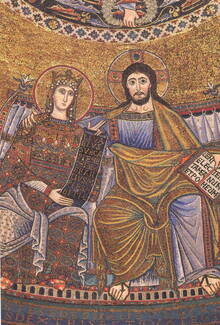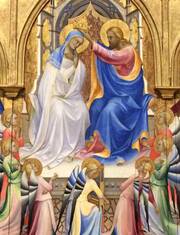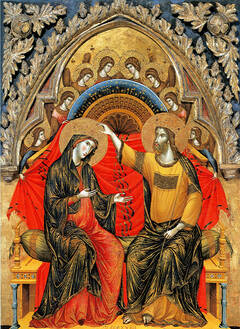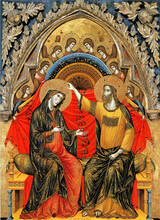The Queenship of Mary
5th Glorious Mystery of the Rosary
Feast Day - 22nd August
Papa Benedict XVI's words on this feast day: in 2010
St John Paul II's words: in 2004
Pope Pius XII wrote in the Marian Year 19854 about proclaiming the Queenship of Mary in his encyclical Ad Caeli Reginam.
3 2us by Father Anthony Doe ![]()
"This is really the meaning of Our Lady as Queen of Heaven: Queen of Mercy, Queen of the compassionate outreach of the Father's love in her Son. And so she stands as the greatest gift to the human race. She is one of us, somebody who is now living her humanity to the full, and who is living it for us, for our salvation, and is there always with that power and authority that comes from God, to take every single human being by the hand and lead them into His merciful presence. "
St John Paul II's Catechesis on Queen of the Universe ![]()
"It can be concluded that the Assumption favours Mary’s full communion not only with Christ, but with each one of us: she is beside us, because her glorious state allows her to follow us on our daily earthly journey. As we read again in St Germanus: "You dwell spiritually with us and the greatness of your vigilance over us makes your communion of life with us stand out" (Hom. 1, PG 98, 344).
Therefore far from creating distance between us and her, Mary’s glorious state brings about a continuous and caring closeness. She knows everything that happens in our existence and she sustains us with maternal love in the trials of life. Assumed into celestial glory, Mary is totally dedicated to the work of salvation so as to communicate to every living person the happiness that has been granted to her. She is a Queen who gives all that she possesses, participating above all in the life and love of Christ."
Catechesis by Pope Benedict XVI 
General Audience, Wednesday 22 August 2012 - also in Croatian, French, German, Portuguese & Spanish & here below in Italian
"Dear Brothers and Sisters,
Today is the liturgical memorial of the Blessed Virgin Mary invoked with the title: “Queen”. It is a feast of recent institution, even though it is ancient in origin and and devotion: it was established, in fact, by the Venerable Pius XII, in 1954, at the end of the Marian Year, fixing the date to 31st May (cf Ad Caeli Reginam). In this circumstance the Pope declared that Mary is Queen more than any other creature through the elevation of her soul and through the excellence of the gifts received. She never ceases to bestow upon humanity all the treasures of her love and care (cf Discourse in honour of Mary Queen, 1 Nov 1954). Now, after the post-conciliar reform of the liturgical calendar, it has been placed eight days after the solemnity of the Assumption so as to underline the close link between the royalty of Mary and her glorification in body and soul beside her Son. In the Second Vatican Council’s Constitution on the Church we read: "Mary was assumed into heavenly glory and exalted by the Lord as Queen of the universe, so as to be the more fully conformed to her Son” (Lumen Gentium, 59).
This is the root of today’s feast: Mary is Queen because she is associated in a unique way to her Son, both on the earthly pathway and in the glory of Heaven. The great saint of Syria, Ephrem the Syrian, affirms, concerning the royalty of Mary, that it derives from her motherhood: she is Mother of the Lord, of the King of kings (cf Is 9, 1-6) and shows us Jesus as our life, salvation and hope. The Servant of God Paul VI recalled in his apostolic exhortation Marialis Cultus: “In the Virgin Mary everything is relative to Christ and everything depends on him: it is for him that God the Father, from all eternity, has chosen her as all holy Mother and has adorned her with gifts of the Spirit, granted to no one else” (n 25).
But now let us ask ourselves: what does Mary Queen mean? Is it only a title united to others, the crown, an ornament among others? What does it mean? What is this royalty? As already shown, it is a consequence of her being united to the Son, of her being in Heaven, that is in communion with God; she participates in God’s responsibility for the world and in God’s love for the world. There is a vulgar, common idea of a king or queen: this would be a person with power, riches. But this is not the type of royalty of Jesus and Mary. Let us think of the Lord; Christ's royalty and being king is interwoven with humility, service, love: it is above all to serve, to help, to love. Let us remember that Jesus was proclaimed king on the cross with this inscription written by Pilate: “King of the Jews” (cf Mk 15, 26). In that moment on the cross it is shown that He is king; and how is He King? By suffering with us, for us, by loving to the very end, and thus He governs and creates truth, love, justice. Or let us also think of another moment: at the Last Supper he bends down to wash the feet of his own disciples. Therefore Jesus’ royalty has nothing to do with that of the powerful of this earth. He is a king who serves his servants; he demonstrated this throughout his whole life. And this is the same with Mary: she is queen in her service to God to humanity, she is queen of love who lives the gift of herself to God so as to enter into the plan of man's salvation. To the angel she responds: “Behold, I am the servant of the Lord” (cf Lk 1, 38) and in the Magnificat she sings: God has looked upon the humility of his servant (cf Lk 1, 48). She helps us. She is queen precisely by loving us, by helping us in our every need; she is our sister, humble servant.
And so we have already reached the point: how does Mary exercise this royalty of service and love? By watching over us, her children: children who turn to her in prayer, so as to thank her or to ask her for her maternal protection and her celestial help, after perhaps having lost the way, oppressed by sorrow or anguish through the sad and troubled vicissitudes of life. In the serenity or the darkness of existence, we turn to Mary entrusting ourselves to her continual intercession, so that she may be able to obtain for us from her Son every grace and mercy necessary for our pilgrimage along the roads of the world. To Him who rules the world and has in hand the destinies of the universe, we turn with trust by means of the Virgin Mary. For centuries she has been invoked as celestial Queen of Heaven; eight times, after the prayer of the holy Rosary, she is implored in the Litany of Loreto as Queen of the Angels, of the Patriarchs, of the Prophets, of the Apostles, of the Martyrs, of Confessors, of Virgins, of all Saints and of Families. The rhythm of these ancient invocations, and daily prayers like the Salve Regina, help us to understand that the Holy Virgin, as our Mother beside her Son Jesus in the glory of Heaven, is with us always, in the daily course of our life.
The title of queen is thus a title of trust, of joy, of love. And we know that she who in part has in hand the fate of the world is good, she loves us and helps us in our difficulties.
Dear friends, devotion to Our Lady is an important element of spiritual life. In our prayer let us not fail to turn trustingly to her. Mary will not fail to intercede for us beside her Son. In looking at her, let us imitate her faith, her full availability to God’s project of love, her generous welcome of Jesus. Let us learn to live from Mary. Mary is the Queen of heaven close to God, but she is also the mother close to each one of us, who loves us and listens to our voice. Thank you for your attention."
Beata Vergine Maria Regina 
Catechesi di Papa Benedetto
Cortile del Palazzo Apostolico di Castel Gandolfo, Mercoledì 22 agosto 2012
"Cari fratelli e sorelle,
Oggi ricorre la memoria liturgica della Beata Vergine Maria invocata con il titolo: “Regina”. E’ una festa di istituzione recente, anche se antica ne è l’origine e la devozione: venne stabilita, infatti, dal Venerabile Pio XII, nel 1954, al termine dell’Anno Mariano, fissandone la data al 31 maggio (cfr Ad caeli Reginam). In tale circostanza il Papa ebbe a dire che Maria è Regina più che ogni altra creatura per la elevazione della sua anima e per l’eccellenza dei doni ricevuti. Ella non smette di elargire tutti i tesori del suo amore e delle sue premure all’umanità (cfr Discorso, 1° novembre 1954). Ora, dopo la riforma post-conciliare del calendario liturgico, è stata collocata a otto giorni dalla solennità dell’Assunzione per sottolineare lo stretto legame tra la regalità di Maria e la sua glorificazione in anima e corpo accanto al suo Figlio. Nella Costituzione sulla Chiesa del Concilio Vaticano II leggiamo così: «Maria fu assunta alla gloria celeste e dal Signore esaltata come Regina dell’universo, perché fosse più pienamente conformata al suo Figlio» (Lumen gentium, 59).
E’ questa la radice della festa odierna: Maria è Regina perché associata in modo unico al suo Figlio, sia nel cammino terreno, sia nella gloria del Cielo. Il grande santo della Siria, Efrem il Siro, afferma, circa la regalità di Maria, che deriva dalla sua maternità: Ella è Madre del Signore, del Re dei re (cfr Is 9,1-6) e ci indica Gesù quale vita, salvezza e speranza nostra. Il Servo di Dio Paolo VI ricordava nella sua Esortazione apostolica Marialis Cultus: «Nella Vergine Maria tutto è relativo a Cristo e tutto da lui dipende: in vista di lui Dio Padre, da tutta l'eternità, la scelse Madre tutta santa e la ornò di doni dello Spirito, a nessun altro concessi” (n. 25).
Ma adesso ci domandiamo: che cosa vuol dire Maria Regina? E' solo un titolo unito ad altri, la corona, un ornamento con altri? Che cosa vuol dire? Che cosa è questa regalità? Come già indicato, è una conseguenza del suo essere unita al Figlio, del suo essere in Cielo, cioè in comunione con Dio; Ella partecipa alla responsabilità di Dio per il mondo e all'amore di Dio per il mondo. C'è un'idea volgare, comune, di re o regina: sarebbe una persona con potere, ricchezza. Ma questo non è il tipo di regalità di Gesù e di Maria. Pensiamo al Signore: la regalità e l'essere re di Cristo è intessuto di umiltà, di servizio, di amore: è soprattutto servire, aiutare, amare. Ricordiamoci che Gesù è stato proclamato re sulla croce con questa iscrizione scritta da Pilato: «re dei Giudei» (cfr Mc 15,26). In quel momento sulla croce si mostra che Egli è re; e come è re? soffrendo con noi, per noi, amando fino in fondo, e così governa e crea verità, amore, giustizia. O pensiamo anche all'altro momento: nell'Ultima Cena si china a lavare i piedi dei suoi. Quindi la regalità di Gesù non ha nulla a che vedere con quella dei potenti della terra. E' un re che serve i suoi servitori; così ha dimostrato in tutta la sua vita. E lo stesso vale per Maria: è regina nel servizio a Dio all'umanità, è regina dell'amore che vive il dono di sé a Dio per entrare nel disegno della salvezza dell'uomo. All'angelo risponde: Eccomi sono la serva del Signore (cfr Lc 1,38), e nel Magnificat canta: Dio ha guardato all'umiltà della sua serva (cfr Lc 1,48). Ci aiuta. E' regina proprio amandoci, aiutandoci in ogni nostro bisogno; è la nostra sorella, serva umile.
E così siamo già arrivati al punto: come esercita Maria questa regalità di servizio e amore? Vegliando su di noi, suoi figli: i figli che si rivolgono a Lei nella preghiera, per ringraziarla o per chiedere la sua materna protezione e il suo celeste aiuto, dopo forse aver smarrito la strada, oppressi dal dolore o dall’angoscia per le tristi e travagliate vicissitudini della vita. Nella serenità o nel buio dell’esistenza, noi ci rivolgiamo a Maria affidandoci alla sua continua intercessione, perché dal Figlio ci possa ottenere ogni grazia e misericordia necessarie per il nostro pellegrinare lungo le strade del mondo. A Colui che regge il mondo e ha in mano i destini dell’universo noi ci rivolgiamo fiduciosi, per mezzo della Vergine Maria. Ella, da secoli, è invocata quale celeste Regina dei cieli; otto volte, dopo la preghiera del santo Rosario, è implorata nelle litanie lauretane come Regina degli Angeli, dei Patriarchi, dei Profeti, degli Apostoli, dei Martiri, dei Confessori, delle Vergini, di tutti i Santi e delle Famiglie. Il ritmo di queste antiche invocazioni, e preghiere quotidiane come la Salve Regina, ci aiutano a comprendere che la Vergine Santa, quale Madre nostra accanto al Figlio Gesù nella gloria del Cielo, è con noi sempre, nello svolgersi quotidiano della nostra vita.
Il titolo di regina è quindi titolo di fiducia, di gioia, di amore. E sappiamo che quella che ha in mano in parte le sorti del mondo è buona, ci ama e ci aiuta nelle nostre difficoltà.
Cari amici, la devozione alla Madonna è un elemento importante della vita spirituale. Nella nostra preghiera non manchiamo di rivolgerci fiduciosi a Lei. Maria non mancherà di intercedere per noi presso il suo Figlio. Guardando a Lei, imitiamone la fede, la disponibilità piena al progetto d’amore di Dio, la generosa accoglienza di Gesù. Impariamo a vivere da Maria. Maria è la Regina del cielo vicina a Dio, ma è anche la madre vicina ad ognuno di noi, che ci ama e ascolta la nostra voce. Grazie per l'attenzione."
Saluti:
"Chers pèlerins de langue française, en ce jour où la liturgie fait mémoire de la Vierge Marie, invoquée sous son titre de Reine, je vous invite à faire de la dévotion envers elle un élément important de votre vie spirituelle. Adressez-vous à elle avec confiance! Imitez sa foi et sa générosité pour accueillir Jésus dans votre vie! Elle est la Reine du ciel, proche de Dieu, mais elle est aussi la mère qui est proche de chacun et de chacune de nous, qui nous aime et qui nous écoute. À tous, et particulièrement aux servants d’autels et au groupe de prière Padre Pio, venus de Nancy, je souhaite un bon séjour et une bonne fin de vacances!
I welcome all the English-speaking pilgrims present at today’s Audience, especially the groups from the Democratic Republic of Congo, Nigeria, Japan and the United States of America. I also greet the young altar servers from Malta and their families. Today the Church celebrates the Queenship of the Blessed Virgin Mary. May the prayers of Our Lady guide us along our pilgrimage of faith, that we may share in her Son’s victory and reign with him in his eternal Kingdom. Upon all of you I invoke the Lord’s abundant blessings!
Mit Freude grüße ich alle Pilger und Besucher deutscher Sprache, die zu dieser Audienz nach Castel Gandolfo gekommen sind. Die Kirche feiert heute den Gedenktag Maria Königin. Es ist der achte Tag nach dem Hochfest ihrer Aufnahme in den Himmel. In dem dogmatischen Text Lumen gentium des Zweiten Vatikanischen Konzils wird gesagt: »Maria wurde als Königin des Alls vom Herrn erhöht, um vollkommener ihrem Sohn gleichgestaltet zu sein, dem Herrn der Herren« (Nr. 59). Das Königtum Christi, wir wissen es, ist ganz durchwoben von Demut, Dienen, Liebe und unterscheidet sich so von irdischen Reichen und Machtblöcken. Das gleiche gilt für Maria: Sie ist Königin im Dienst für Gott und für die Menschen. Sie ist eine Königin der Liebe, die ihre Hingabe an Gott lebt und so in den Plan der Erlösung Gottes für die Menschen eintritt. Als Königin des Himmels ist sie Gott ganz nahe. Aber weil sie Gott nahe ist, ist sie uns nahe. Als eine Mutter, die uns liebt und kennt, will sie uns allen nahe sein. Ihr mütterlicher Segen möge euch auf allen euren Wegen begleiten.
Saludo cordialmente a los peregrinos de lengua española, en particular al grupo de la Basílica de Nuestra Señora del Socorro, de Aspe, así como a los provenientes de España, México y otros países latinoamericanos. Invito a todos, a encomendar nuestras súplicas a la intercesión de la Santísima Virgen, que hoy invocamos como Reina, pues la Madre del Rey de Reyes no dejará de presentar nuestra oración confiada al corazón de su divino Hijo, ni de velar por nosotros en nuestro peregrinaje terreno. Que Dios os bendiga.
Amados peregrinos de língua portuguesa, uma cordial saudação de boas-vindas para todos. Hoje, a Igreja celebra Nossa Senhora Rainha dos Céus e da terra que, a exemplo de Seu Filho Jesus, Senhor do Universo, manifesta a sua realeza através da humildade, do serviço e do amor. Na vossa oração, não deixeis de dirigir-vos a Ela com confiança. Possa A Virgem Maria velar por cada um de vós. E que Deus vos abençoe.
Pozdrawiam polskich pielgrzymów. Najświętszej Maryi Pannie Królowej zawierzam was, tu obecnych, wasze rodziny i waszą ojczyznę. Poddając się pod Jej matczyne panowanie, radujcie się Jej opieką i Bożym błogosławieństwem! Niech będzie pochwalony Jezus Chrystus!
S láskou pozdravujem slovenských pútnikov, osobitne z Farnosti Lúčky. Bratia a sestry, Cirkev dnes v liturgii slávi spomienku preblahoslavenej Panny Márie Kráľovnej. S dôverou sa obracajme na túto našu dobrotivú Matku v každej našej potrebe. Rád žehnám vás i vaše rodiny. Pochválený buď Ježiš Kristus!
Alla fine, rivolgo un cordiale saluto ai pellegrini di lingua italiana; in particolare alle Suore di Maria Santissima Consolatrice, riunite per il loro Capitolo Generale, e alle Suore Caldee Figlie di Maria Immacolata, impegnate in un generoso e prezioso servizio alle popolazioni dell’Iraq. Saluto i partecipanti all’incontro dell’Associazione Famiglie Rogazioniste e all’incontro estivo per Seminaristi Maggiori, come pure le coppie di sposi novelli. Tutti invito a dedicare tempo alla formazione cristiana, per essere fedeli discepoli di Cristo, che è via, verità e vita. E adesso cantiamo insieme il Padre Nostro."
Poppy, from England ![]()
"Our Lady is the Queen of Heaven - what does that mean? That means that she is our mother and she loves us. And she desires with her whole heart for us to be close to Jesus, and if we turn to her in prayer she can help us. And that to me is something that's tremendously wonderful and beautiful: God has given us this gift of his own mother to intercede for us, to help us, to be our mother. The Queen of Heaven can help us and intercede for us so that one day we can meet our Creator."
Father Armen, from Armenia ![]()
"Our Lady is the Queen of Heaven, the Mother of the Church and the Mother of humanity. She is the one who can crush and does crush the head of Satan under her feet. God bless her."
Pope St John Paul II's Message to the General Assembly of the United Nations
Feast of the Coronation of Our Lady, 22 August 1980
- also in French, Italian, Portuguese & Spanish
My first major point is an appeal to all of you here, to all peoples everywhere. It is an appeal to go beyond any static positions that belong to a particular ideology. Let every system and each functioning part of a system look to what in fact it can do, to ask what in fact it can contribute, to see how in fact it can advance the real goals of human living, regardless of whatever positions the stale arguments of ideological bias may wish to impose artificially - positions and biases which may hinder rather than promote real progress and fraternal collaboration.
There is no question but that this great Assembly has men and women of different, even opposed, systems and ideologies. We cannot, however, afford to let the limitations of ideological biases obstruct our concern for man - man in the concrete, the whole man, every man. Therefore we cannot let these ideological categories imprison us. We cannot let outdated conflicts control us in such a way that we cannot respond to the real needs of peoples everywhere. .........
In my pastoral visits in Europe, in North and South America and in Africa, I have spoken often and in varying ways of the need for the conversion of hearts. I have stressed the need for each one of us to be converted, to see in the other person a brother or a sister united by the bond of a common humanity under God. My predecessor Paul VI in his encyclical "Populorum Progressio", a document which remains one of the enduring and valid contributions to the work of development, said: "There can be no progress towards the complete development of man without the simultaneous development of all humanity in a spirit of solidarity... ‘Man must meet man, nation must meet nation, as brothers and sisters, as children of God. In this mutual understanding and friendship, in this sacred communion, we must also begin to work together to build the common future of the human race’ ".
May I complete this message to you today by recalling these words and this perspective to your reflection. May I ask that as you seek a change in the structures that will better serve the common good in justice and equity, you will not forget the education and inspiration of your peoples that will help bring about the conversion of hearts. Only through the conversion of hearts can brothers and sisters "build the common future of the human race", and construct the great and lasting edifice of peace. And it is to this peace - the new name of which aptly remains "development" - that all the efforts of this Special Session must be directed. With God’s help may it be so!




